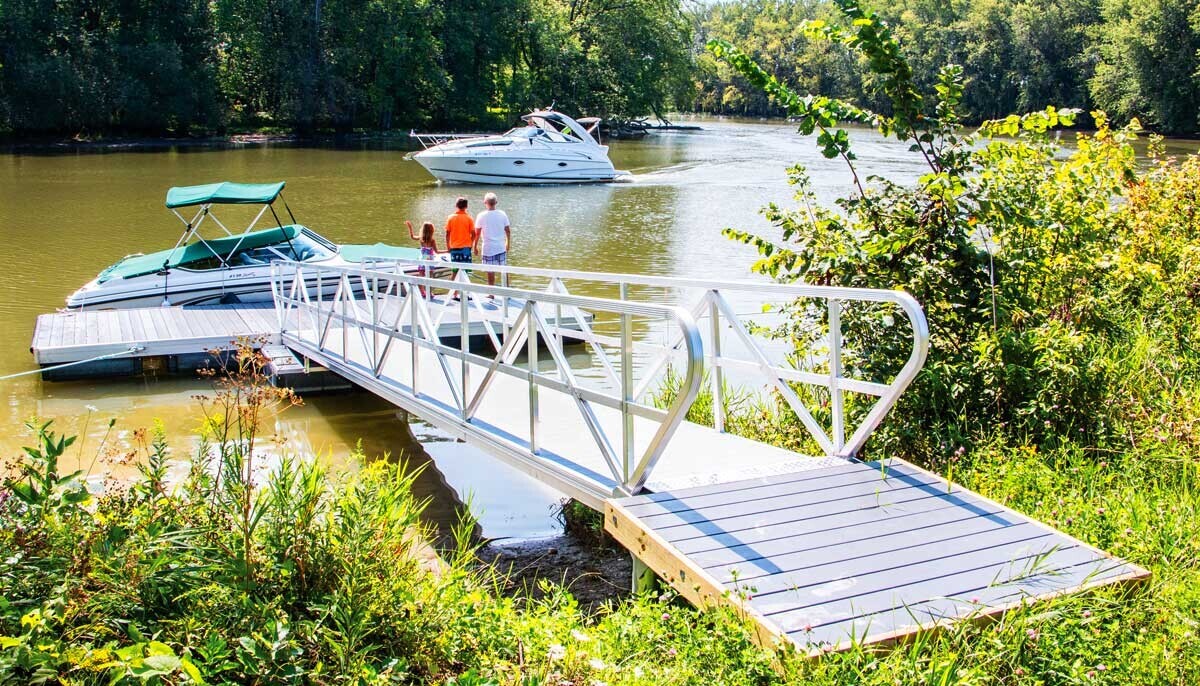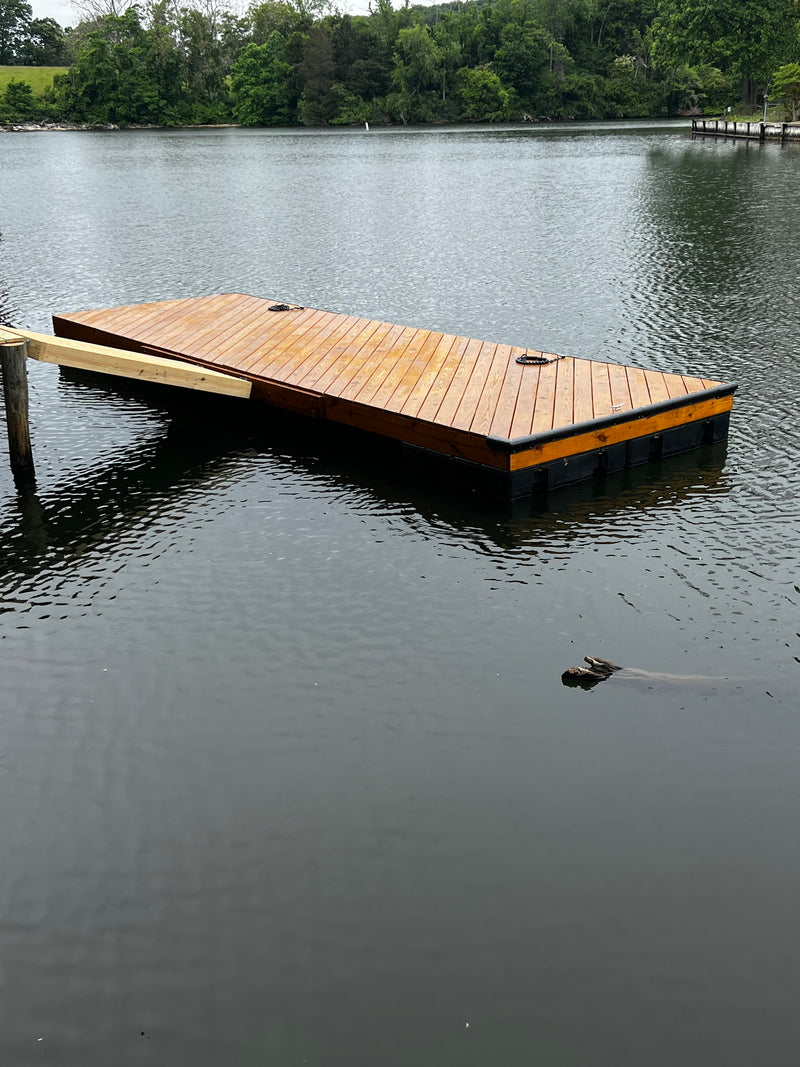The Ultimate Guide to Choosing the very best Floating Docks
Picking the optimal floating dock calls for a detailed understanding of numerous elements that affect both efficiency and durability. Factors such as dock types, materials, and vital attributes significantly affect your decision-making procedure. Factors to consider around installation and budget can better complicate the option. By analyzing these facets systematically, one can make sure an investment that not only satisfies immediate needs however likewise boosts general building value. As we explore these essential elements, it ends up being clear that the best options can bring about a enduring and practical remedy customized to your specific demands.
Understanding Floating Dock Kind
When choosing a floating dock, it is necessary to recognize the various kinds available, as each offers unique functions and applications. Floating docks largely fall under three groups: modular, fixed, and pontoon docks.
Modular docks are made up of individual sections that can be conveniently constructed or reconfigured, making them ideal for changing water levels and diverse uses, such as recreational tasks or industrial operations. Their flexibility permits customization based upon certain requirements.

Pontoon docks are characterized by their resilient structure, usually made up of numerous pontoons that supply security and support. They are especially appropriate for larger vessels and are commonly used in marinas or for waterside homes. Understanding these types help in choosing one of the most suitable floating dock to meet particular requirements, guaranteeing optimum capability and security.
Trick Products for Sturdiness
Choosing the right materials for floating docks significantly effects their resilience and long life. One of the most typical materials include wood, plastic, steel, and composite products, each offering unique benefits and constraints.
Wood, commonly favored for its visual charm, requires regular maintenance to hold up against dampness and degeneration. Pressure-treated lumber can boost resistance to rot, but it may still be at risk to pests and weathering.

Plastic docks, made from high-density polyethylene (HDPE), are resistant to deterioration, UV radiation, and influence, making them a popular selection for seaside atmospheres. Their lightweight nature additionally helps with simple installment and relocation.
Steel docks, normally created from light weight aluminum or galvanized steel, give remarkable strength and longevity. They are resistant to rust, especially when treated, however may need extra insulation to stop heat accumulation in hot climates.
Composite materials, incorporating wood fibers and plastics, deliver the advantages of both timber and plastic, resisting wetness and fading while requiring marginal maintenance. - floating docks
Inevitably, the option of materials should line up with environmental conditions, planned usage, and maintenance choices to guarantee the floating dock stays functional and visually pleasing in time.
Vital Functions to Think About
While the selection of products click here to find out more is critical, thinking about essential functions for floating docks is equally vital to make certain optimal performance and customer complete satisfaction. One vital feature to analyze is the dock's buoyancy capability, which establishes just how much weight it can support without immersing. floating dock builder. This is essential for accommodating boats, individual watercraft, and even recreational activities
In addition, transportability is a considerable consideration. Depending upon your needs, you might want a dock that is easy to take apart and carry, especially if you prepare to relocate it seasonally. Security is another vital function; a properly designed floating dock needs to lessen motion brought on by wind and water currents, giving a protected system for users.
Safety features, such as non-slip surfaces and rounded edges, are additionally vital to stop accidents, specifically in wet conditions. Think about the accessibility of devices, such as bumpers, cleats, and ladders, which can improve the performance of your dock.
Installment and Upkeep Tips
Establishing up and maintaining a drifting dock needs mindful planning and interest to information to guarantee its long life and optimum performance. Begin by picking an appropriate location that lessens direct exposure to solid currents and waves, which can cause wear and tear. Guarantee that the water deepness suffices for the dock's elevation and that it is anchored securely to avoid motion.
Throughout setup, adhere to the manufacturer's guidelines carefully, as improper assembly can compromise security. Usage premium products resistant to deterioration, such as aluminum or treated timber, to improve longevity. Frequently evaluate all components, consisting of drifts, connectors, and securing systems, for signs of damages or wear.
If your dock utilizes flotation gadgets, guarantee they continue to be free and undamaged from leaks. By adhering to these setup and maintenance tips, you can appreciate a functional and dependable floating dock for years to come.
Budgeting for Your Dock
Budgeting for your dock is a vital action that can considerably impact your total fulfillment and investment in a waterfront home. Establishing a clear spending plan assists you browse the various options offered and guarantees you make educated choices that straighten with your financial capacities.
Begin by figuring out the size and design of the dock you need, as these factors will substantially influence the expense. Floating docks can differ considerably in price, relying on products, buoyancy, and features like ramps and devices. Research different makers and providers to compare rates and comprehend the market worth.
Along with initial article source expenses, consider recurring costs such as upkeep, insurance coverage, and prospective fixings. Assign funds for these reoccuring expenses to avoid shocks down the line. It's also sensible to budget for any type of necessary permits or evaluations, which may be required by neighborhood laws.
Last but not least, bear in mind the potential roi. A well-planned dock can enhance your property's value and charm, supplying a positive economic influence in the long term. By budgeting properly, you can make certain that your dock satisfies your demands without compromising your monetary security.
Final Thought
In conclusion, choosing the excellent floating dock necessitates an extensive examination of different aspects, consisting of dock kinds, materials, vital functions, and installment procedures. Cautious consideration of budgetary restraints will additionally make certain a sound financial investment.

While the selection of products is important, considering important features for floating docks is browse around this web-site similarly vital to make certain optimal efficiency and user fulfillment.Setting up and keeping a drifting dock needs mindful planning and attention to detail to ensure its longevity and optimal performance. Floating docks can vary considerably in cost, depending on materials, buoyancy, and attributes like devices and ramps.In final thought, selecting the perfect floating dock necessitates a detailed analysis of various factors, consisting of dock kinds, products, essential features, and setup processes.